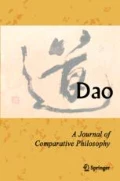Abstract
The debate over whether human nature is good or bad and how this is related to self-cultivation was central in the minds of traditional Chinese thinkers. This essay analyzes the interrelationship between the key concepts of xing 性 (human nature), qing 情 (human emotions/feelings), and xin 心 (heart-mind) in the Guodian text of the Xing Zi Ming Chu 性自命出 (Nature Derives from Mandate) discovered in 1993 in Hubei province. The intellectual engagements evident in this Guodian text emerge as more syncretic and dynamic than those that can be found in the discourse of any single tradition, such as Gaozi, Mencius, or Xunzi. Its thesis on human nature and moral cultivation reveals the existence of a possibly more diverse intellectual discourse from which the different foci of philosophical debate represented by later thinkers developed.
Similar content being viewed by others
References
Andreini, Attilio. 2006. “The Meaning of Qing 情 in the Texts of Guodian Tomb No. 1.” In Love, Hatred, and Other Passions: Questions and Themes on Emotions in Chinese Civilization. Edited by Paolo Santangelo and Donatella Guida. Leiden: Brill.
Brindley, Erica. 2006. “Music and ‘Seeking One’s Heart-Mind’ in the ‘Xing Zi Ming Chu.’” Dao: A Journal of Comparative Philosophy 5.2: 247–255.
Chan, Shirley. 2009. “The Ruler/Ruled Relationship in the ‘Black Robes’ Contained in the Newly Excavated Guodian Bamboo Texts.” Journal of Asian History 43.1: 19–30.
Cook, Scott. 1997. “Zhuang Zi and His Carving of the Confucian Ox.” Philosophy East and West 47.4: 521–554.
Czikszentmihalyi, Mark. 2004. Material Virtue: Ethics and the Body in Early China. Leiden: Brill.
Ding, Sixin 丁四新. 2000. A Study of Thinking in the Guodian Bamboo Slips 郭店楚墓竹簡思想研究. Beijing 北京: Dongfang Chubanshe 東方出版社.
Ding, Yuanzhi 丁原植. 2000. Four Analytical Studies on the Guodian Confucian Texts 郭店楚簡儒家佚籍四種釋析. Taibei 臺北: Taiwan Guji Chubanshe 台灣古籍出版社.
_____. 2002. Studies on Human Nature and Emotions in the Guodian Confucian Texts楚簡儒家性情說研究. Taibei 臺北: Wanjuan Lou 萬卷樓.
Eifring, Halvor, ed. 2004. Love and Emotions in Traditional Chinese Literature. Leiden: Brill.
Goldin, Paul. 2005. “Xunzi in the Light of the Guodian Manuscripts.” In his After Confucius. Honolulu: University of Hawai’i Press.
Graham, A.C. 19[86]90. “The Meaning of Ch’ing,” Appendix to “The Background of Mencian Theory of Human Nature.” In the reprint of Studies in Chinese Philosophy and Philosophical Literature. Singapore: Institute of East Asian Philosophies.
_____. 1989. Disputers of the Tao. La Salle, Illinois: Open Court.
Guo, Yi 郭沂. 2001. The Guodian Bamboo Slip Texts and the Intellectual History in the Pre-Qin Period 郭店竹簡與先秦學術思想. Shanghai 上海: Shanghai Jiaoyu Chubanshe 上海教育出版社.
Hansen, Chad. 1995. “Qing in Pre-Buddhist Chinese Thought.” In Emotions in Asian Thought: A Dialogue in Comparative Philosophy. Edited by Joel Marks and Roger T. Ames. Albany: State University of New York Press.
Ivanhoe, Philip J. 2000. Confucian Moral Self Cultivation, 2nd ed. Indianapolis: Hackett.
Jingmenshi Bowuguan 荊門博物館, ed. 1998. The Bamboo Scripts from the Tomb of Chu in Guodian 郭店楚墓竹簡. Beijing 北京: Wenwu Chubanshe 文物出版社.
Lau, D.C. 1979. Confucius—the Analects. London: Penguin.
Lee, Janghee. 2004. Xunzi and Early Chinese Naturalism. Albany: State University of New York Press.
Legge, James, trans. 1967. The Li Ki: Book of Rites, vol. 1, reprint. New Hyde Park, NY: University Books.
Li, Ling 李零. 2002. A Collation of the Guodian Manuscripts 郭店楚簡校讀記. Beijing 北京: Beijing Daxue Chubanshe 北京大學出版社.
Li, Tianhong 李天虹. 2003. Study on the Guodian Text of the “Nature Derives from Heaven”《性自命出》研究. Wuhan 武漢: Hubei Jiaoyu Chubanshe 湖北教育出版社.
Liang, Tao 梁濤. 2004. “The Guodian Bamboo Text of the “Nature Derives from Heaven” and Mencius 4b26 竹簡《性自命出》與 《孟子》天下之言性也章.” History of Chinese Philosophy 中國哲學史 4: 70-76.
Liu, Zhao 劉釗. 2003. An Explanatory Reading of the Guodian Manuscripts 郭店楚簡校釋. Fuzhou 福州: Fujian Renmin Chubanshe 福建人民出版社.
Marks, Joel and Roger T. Ames, eds. 1995. Emotions in Asian Thought: A Dialogue in Comparative Philosophy. Albany: State University of New York Press.
Perkins, Franklin. 2005. “Following Nature with Mengzi or Zhuangzi.” International Philosophical Quarterly 45.3: 327–340.
Puett, Michael. 2004. “The Ethics of Responding Properly: The Notion of Qing 情 in Early Chinese Thought.” In Love and Emotions in Traditional Chinese Literature. Edited by Halvor Eifring. Leiden: Brill.
Qiu, Xigui 裘錫圭. 2003. “From the Guodian Text of the ‘Nature Derives from Heaven’ to Mencius 4b26 由郭店簡《性自命出》的‘室性者故也’說到《孟子》‘天下之言性也’章.” A Proceeding of the Fourth International Symposium on the Chinese Ancient Philology 香港中文大學2003年第四屆國際中國古文字學研討會論文集.
_____. 2004. “Reports on the Progress of the Study of the Guodian Chu Slips by Peking University” 關於北京大學郭店楚簡研究課題進展的報告. In Rethinking Confucianism: Selected Papers from the Third International Conference on Excavated Chinese Manuscripts, Mount Holyoke College, April 2004 儒學的再思考: 第三屆簡帛研討會論文選, ed. Xing Wen 邢文.
Slingerland, Edward. 2008. “The Problem of Moral Spontaneity in the Guodian Corpus.” Dao: A Journal of Comparative Philosophy 7.3: 237–256.
Solomon, R. 1995. “Some Notes on Emotion: East and West.” Philosophy East and West 45.2: 171–202.
Shun, Kwong-loi. 1997. Mencius and Early Chinese Thought. Stanford, California: Stanford University Press.
Touhey, John C. 1973. “A Review of Lucien Malson’s Wolf Children and the Problem of Human Nature” (New York: Monthly Review Press, 1972). Contemporary Sociology: A Journal of Reviews 2.4: 395–397.
Tu, Weiming. 1999. “The Guodian Chu Texts and the Renewed Position of Pre-Qin Ru and Dao Thought 郭店楚簡與先秦儒道思想的重新定位.” In Studies of the Guodian Bamboo Slip Manuscripts郭店楚簡研究. Ed. by the Editorial Committee of Chinese Philosophy 中國哲學 and the International Confucian Association Council. Shenyang 沈陽: Liaoning Jiaoyu Chubanshe 遼寧教育出版社.
Tu, Zongliu 涂宗流, and Liu Zuxin 劉祖信. 2001. An Explanatory Reading of the Unfound Pre-Qin Confucian Manuscripts in the Guodian Corpus 郭店楚簡先秦儒家佚書校釋. Taibei 臺北: Wanjuan Lou 萬卷樓.
Author information
Authors and Affiliations
Corresponding author
Rights and permissions
About this article
Cite this article
Chan, S. Human Nature and Moral Cultivation in the Guodian 郭店 Text of the Xing Zi Ming Chu 性自命出 (Nature Derives from Mandate). Dao 8, 361–382 (2009). https://doi.org/10.1007/s11712-009-9138-5
Published:
Issue Date:
DOI: https://doi.org/10.1007/s11712-009-9138-5




